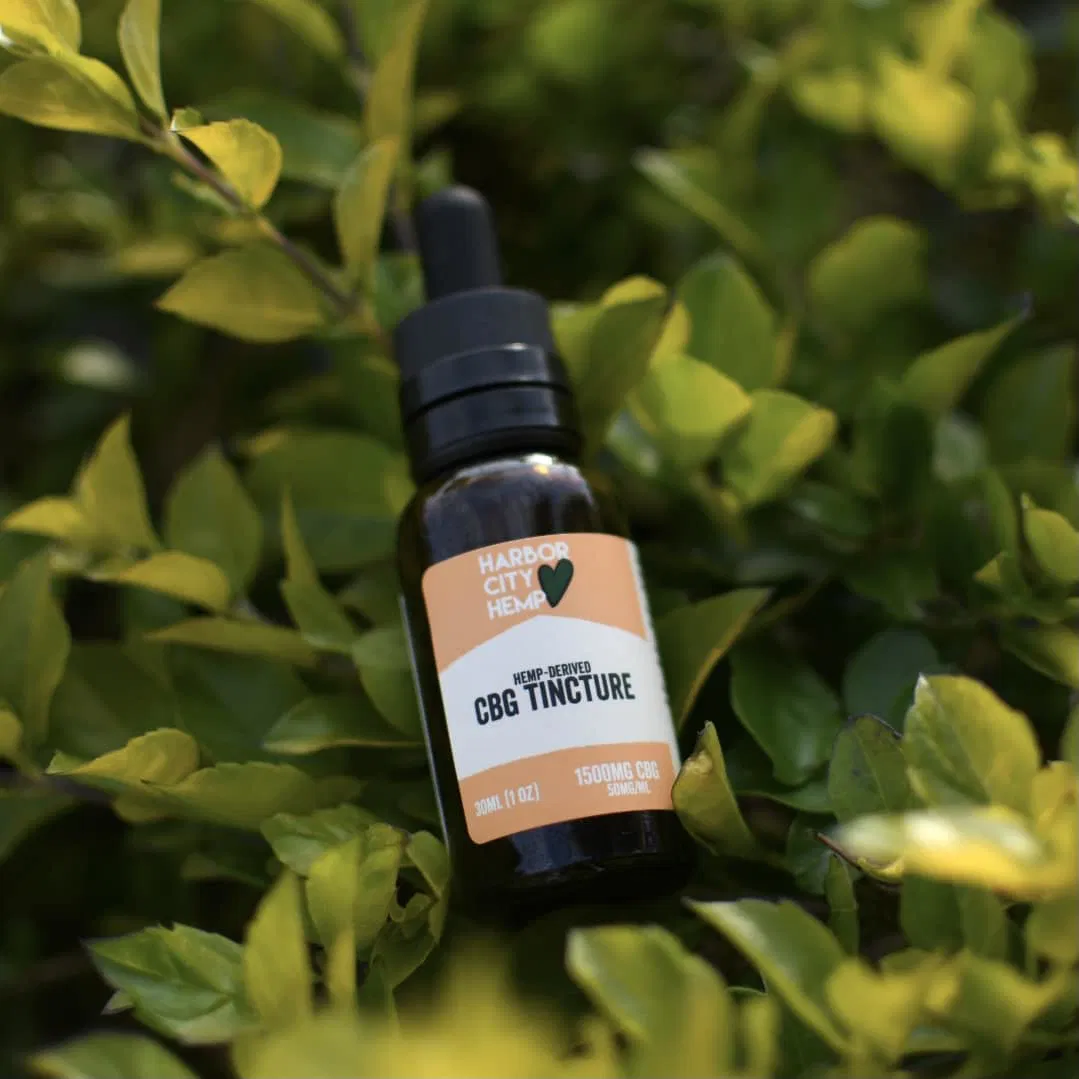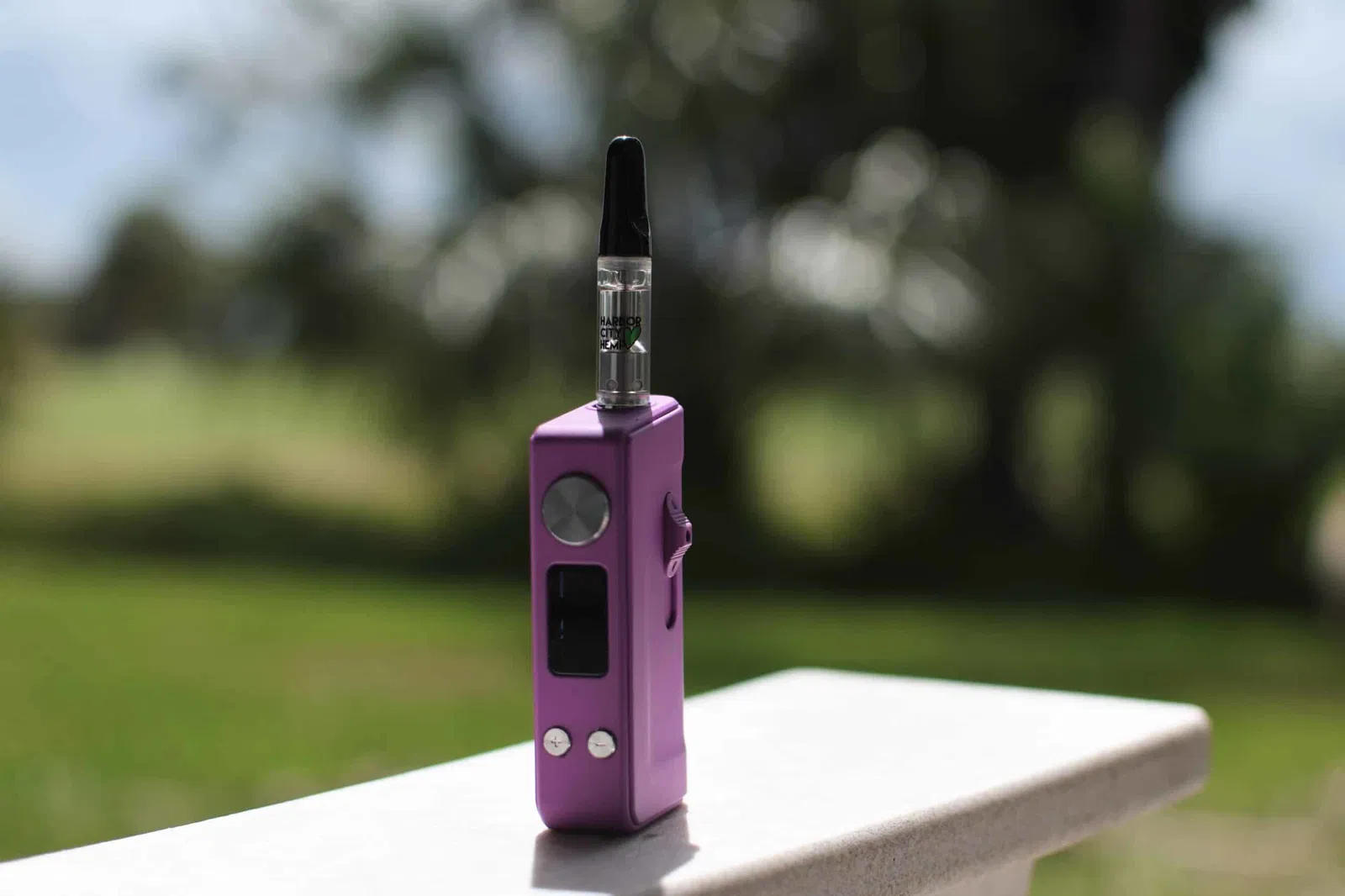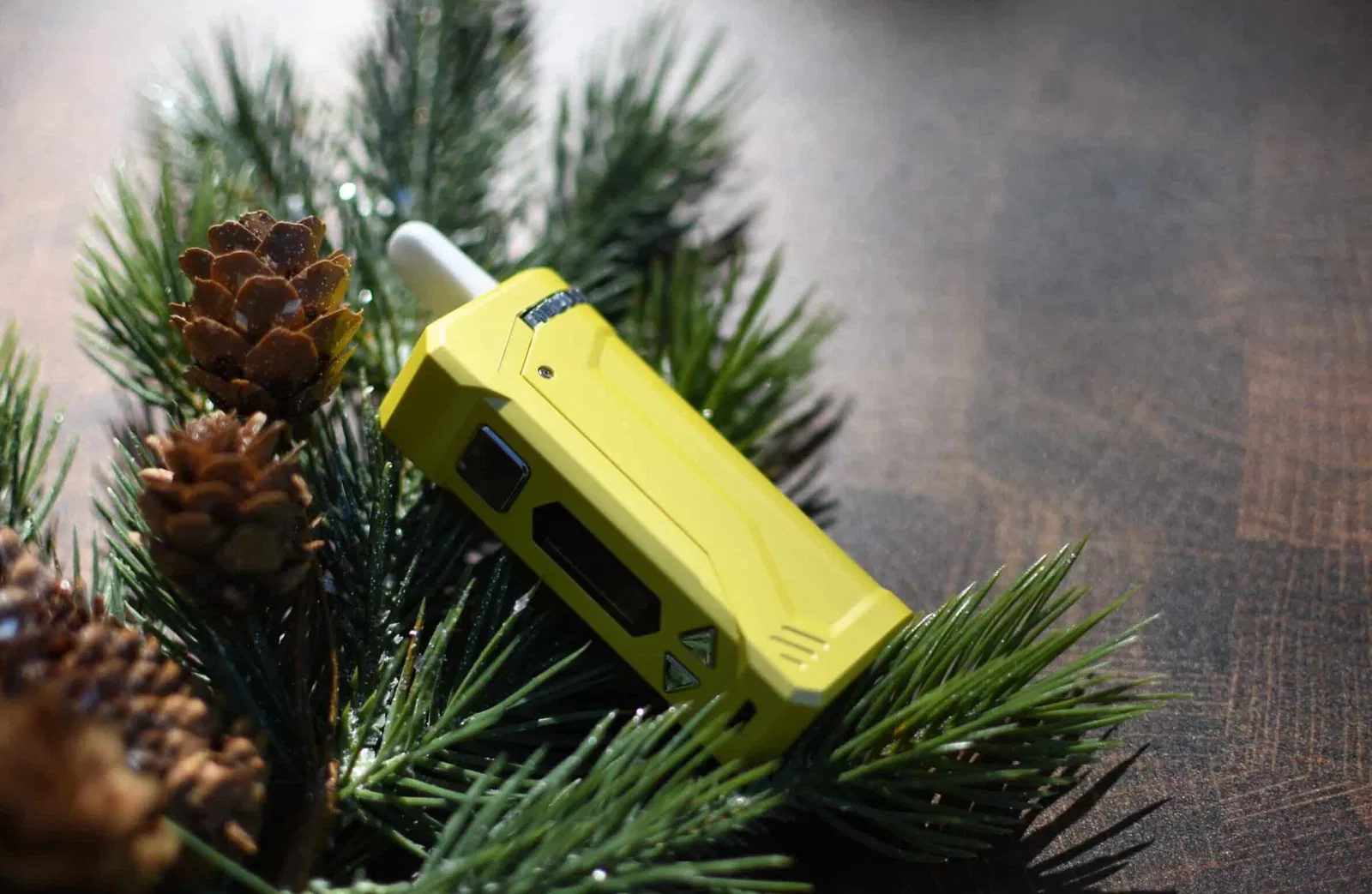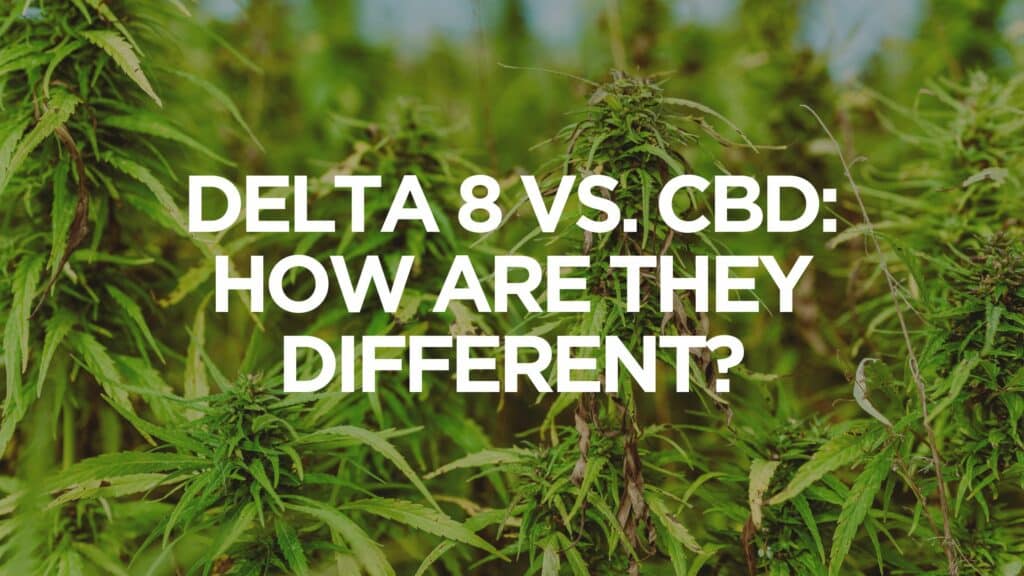Cannabis Category
Delta 8 vs CBD: How Are They Different?
Delta 8 is a newly emerged cannabinoid making a buzz in the cannabis industry. Since the cannabis plant naturally produces only trace amounts of it, it has to be isomerized from CBD. In this article, we will discuss Delta 8 vs. CBD. Is Delta 8 the same as CBD? To know more, let us start by differentiating hemp from marijuana.
The Difference Between Hemp and Marijuana
Before discussing CBD and Delta 8 THC, it is essential to differentiate between hemp and marijuana. Hemp and marijuana are both cannabis plants. They look similar in many aspects, but there is a slight variation in their cannabinoid content.
The difference is their concentration of the psychoactive cannabinoid called tetrahydrocannabinol (THC). By legal definition, hemp should contain 0.3% THC or less. Hemp and all hemp-derived products should not have more than 0.3% THC.
All cannabis plants containing more than 0.3% THC are considered marijuana plants. People usually use ‘marijuana’ to refer to cannabis that can get you psychoactively high. The term ‘weed’ is also used interchangeably.
The legal difference between hemp and marijuana has been defined in the Agricultural Act of 2018, more commonly known as the 2018 Farm Bill.
What is CBD?
Cannabidiol (CBD) is the most predominant cannabinoid in hemp and the second most predominant in marijuana, next to tetrahydrocannabinol (THC). CBD is the main component in medical marijuana and is often derived from hemp. However, it can also be derived from other cannabinoids through isomerization.
Is CBD Legal?
CBD is easy to obtain in the United States. All 50 states have laws that legalize CBD with various restrictions. The FDA eased the regulatory requirements on CBD trials in 2015. The 2018 Farm Bill made hemp and its derivatives federally legal.
With the 2018 Farm Bill in effect, all hemp-derived products, including CBD and Delta 8 THC, were removed from the Controlled Substances Act. However, CBD is only considered federally legal if it is derived from hemp, not marijuana.
Many people obtain CBD products online even without a medical marijuana card. Online CBD purchases are considered legal in most states, but please check your local laws on CBD before purchasing online.
The Potential Health Benefits of CBD
CBD is popular because of its potential health benefits. Today, the most convincing scientific evidence for its effectiveness is in treating Lennox-Gastaut Syndrome (LGS) and Dravet Syndrome, two of the most severe childhood epilepsy syndromes. Various studies indicate that CBD was able to reduce or stop the seizures caused by these epileptic diseases.
Animal studies and numerous anecdotal reports indicate that CBD may help with chronic pain, anxiety, insomnia, and certain forms of addiction. The scientific evidence is insufficient to make conclusive statements. However, ongoing clinical trials may soon shed light on the effectiveness of CBD in treating these conditions.
Does CBD Get You High?
CBD is not a psychoactive cannabinoid, meaning it will not get you high. No matter how much CBD you take into your system, you will not feel the same high that you experience with THC. Its non-psychoactive nature made it possible to be legalized in the first place.
If you intend to be productive for the rest of the day, do not consume too much CBD. Although it may not get you high, it may still cause adverse side effects that can disrupt your regular daily routines. For instance, taking too much of it may cause you to get sedated and couch-locked.
Is CBD Safe?
CBD is generally considered safe, but taking too much of it may cause side effects like fatigue, nausea, and irritability. It may also increase the blood thinning effects of certain medicines by competing with the liver enzymes that help break them down. This effect is similar to that caused by grapefruit.
Consuming high doses of CBD may cause abnormalities in blood tests related to the liver. Acetaminophen and other similar non-prescription drugs also have this effect. Hence, it is always essential to consult your doctor before consuming CBD products, especially if you are taking medications.
Remember that most CBD products are sold as supplements, not as medicine. The FDA does not regulate the purity and safety of CBD and other dietary supplements. Currently, no specific CBD dose is considered effective for any particular medical condition.
CBD Consumption Methods
CBD comes in various forms of consumption, including buds, oils, capsules, vapes, tinctures, and topical solutions. If you hope to induce relaxation, you can take CBD orally or sublingually. Oils and tinctures are best for sublingual administration. If you want to experience the effects of CBD almost immediately, consider smoking CBD buds or vaping CBD vape juice.
Alternatively, you can use CBD directly on the skin to reduce inflammation, alleviate muscle soreness, and help muscle recovery. CBD-infused oil, lotion, or cream is your best option. However, you may also use a CBD batch bomb or a CBD patch.
Taking CBD through inhalation or sublingual administration produces faster effects. However, if you want longer-lasting results, take it orally. Ingesting CBD oil or eating CBD edibles may have a more delayed onset of effects, but they generally last longer (around four to six hours).
If you want CBD for its health benefits, it may be best to consume Harbor City Hemp THC-Free CBD Tincture. Experience the benefits of hemp without getting high.
Takeaways
Please note that CBD is not a cure-all for diseases and medical ailments. Currently, it is effective against specific types of childhood epilepsy. Preliminary studies indicate that it may alleviate chronic pain, inflammation, anxiety, and addiction. However, we need more scientific research to provide its effectiveness against these conditions.
CBD is available today as a dietary supplement. The FDA does not regulate its purity and safety. It is always best to consult with your healthcare provider before using CBD. If you are taking certain medications or are experiencing any medical conditions, talk to your doctor first.
If you decide to consume CBD for any reason, including relaxation, anxiety, insomnia, or pain, buy it from a reputable source. Never purchase cannabis products from illicit sources.
For the best quality, purchase Harbor City Hemp CBD Tincture.
What is Delta 8 THC?
What exactly is Delta 8 THC? It is a cannabis compound that is popular because of its similarities with delta 9 THC. You may often hear about THC as the psychoactive compound in marijuana. However, there are different types of THC. Nevertheless, the most predominant and usually talked about THC compound is delta 9 THC. We may refer to it as the regular THC.
Delta 8 THC is a similar compound but is not as abundant in the cannabis plant. It only occurs naturally in less than 1% concentration. Therefore, it is challenging to extract commercial amounts of it through plant extraction. Most Delta 8 products you find on the market are derived through isomerization.
Delta 8 THC has a similar molecular structure to delta 9 THC, except for a slight variation in their carbon double bonds. While delta 9 has a double bond on the ninth carbon chain, Delta 8 has a double bond on the eighth carbon chain. This small variation in the location of the double bonds causes a change in the potency of their psychoactive effects.
Is Delta 8 Legal?
The legality of Delta 8 is somewhat in the gray area. The 2018 Farm Bill makes hemp and all its derivatives legal. However, the psychoactive nature of Delta 8 prompted lawmakers from some states to specifically ban the use of this cannabinoid.
Delta 8 is commonly derived from hemp, not marijuana. Hence, it is still considered legal in many states where marijuana is expressly illegal. Nearly all Delta 8 products today are manufactured using hemp-derived CBD.
Remember that the 2018 Farm Bill legalized hemp in the United States. All hemp-derived products are legal as long as they do not contain more than 0.3% delta 9 THC. Nevertheless, some states chose to adopt a different definition regarding Delta 8 THC.
Before you purchase and consume Delta 8 products, check your local laws regarding its legality in your area.
How is Delta 8 Made?
There are trace amounts of Delta 8 in cannabis plants. It isn’t easy to extract it directly from the plants. Hence, it has to be isomerized from another cannabinoid, such as CBD. Most of the Delta 8 in the market today are derived directly from CBD.
CBD is extracted from hemp, refined into isolate, and then isomerized into Delta 8. The process is more expensive than CBD extraction, but it is the most cost-effective way to produce commercial amounts of Delta 8.
Will Delta 8 Get You High?
Based on reports, Delta 8 still delivers a high with a lower potency than delta 9. It causes euphoria, relaxation, a happy mood, and other effects. However, the lower strength may reduce the likelihood of experiencing anxiety and paranoia.
Some consumers prefer Delta 8 because it is milder. However, many consumers take it because it allows them to experience the psychoactive effects of marijuana without breaking the law.
How Long Is the Delta 8 High?
Although the high is less potent, it lasts as long as regular THC. The effect may last an hour or two if you consume Delta 8 through inhalation (smoking or vaping). If you ingest it in the form of gummies or other edibles, the effect may last as long as two to four hours.
The sedative effects of Delta 8 may interfere with your productivity. The duration of effects depends on how much you consume. Please remember that taking too much may cause you to experience a couch-lock.
Delta 8 Benefits and Effects
Delta 8 is one of the most recently commercially produced cannabinoids. Hence, there is very little scientific data about its reported health benefits. Nevertheless, anecdotal evidence suggests that it may have similar potential health benefits as regular THC. Hence, it may help with pain relief, insomnia, and anxiety. Before we can make conclusive statements about these potential benefits, we still have to wait for the results of actual clinical studies on humans.
Many consumers report that Delta 8 produces mild euphoria, feelings of happiness, and relaxation. Although the psychoactive high is less potent, you may experience the munchies, dry mouth, red eyes, and short-term memory when you consume more than your ideal dose.
How Much Delta 8 Should You Consume?
It all depends on your body chemistry. If it is your first time consuming psychoactive cannabinoids, then Delta 8 will affect you strongly. If you have previously taken regular THC products, then Delta 8 will affect you mildly.
You can purchase Delta 8 as gummies, vapes, tinctures, etc. Many producers produce Delta 8 products at approximately twice the potency of regular THC products. For instance, regular THC gummies may come in 10 mg doses, while Delta 8 THC gummies come in 25 mg doses.
If it is your first time consuming Delta 8 THC, start with the lowest dose and work your way up. See how it affects your body and add more if you do not feel any of the desired results. If, for instance, a 25 mg gummy is too strong, you can consume half a gummy instead.
If you are not a fan of gummies, check out the Harbor City Hemp Delta 8 Distillate.
Will Delta 8 Show Up on a Drug Test?
Since Delta 8 is a THC cannabinoid, it may show up on a drug test. We still know very little about the compound but know by experience that it causes a psychoactive effect like regular THC. Hence, it is a safe bet to stop taking it at least a week or two before an upcoming drug test.
Is Delta 8 Safe?
When taken in large doses, Delta 8 may induce adverse side effects similar to THC, including anxiety, paranoia, nausea, vomiting, extreme sedation, and fatigue. You can easily avoid these nasty side effects by taking a moderate dose. Never indulge in too many Delta 8 edibles within the same day, and always take it only during your leisure.
The main risk factor for Delta 8 comes from consuming untested and unlicensed products from the illicit market. These products may contain contaminants that may damage your health. They may be cheaper than legal Delta 8 products, but they may pose an unknown health risk.
Delta 8 is a relatively new cannabinoid. Hence, finding products containing actual Delta 8 THC may be challenging. Always buy Delta 8 products from trusted sources like Harbor City Hemp Delta 8 products.
Takeaways
Delta 8 THC is a cannabinoid made by the cannabis plant in trace amounts. However, it can be isomerized from CBD to produce large quantities for commercial purposes.
The mild psychoactive high of Delta 8 compared to THC is preferable for some cannabis users. Although Delta 8 may be derived from hemp, it is banned in some states because of its psychoactive effects.
Delta 8 Vs. CBD: The Differences
Although Delta 8 and CBD are primarily derived from hemp for legal purposes, they are two different kinds of compounds. Let us dig deeper to learn the difference between CBD and Delta 8.
Psychoactive Effects
CBD is a non-psychoactive compound. It will not get you high. However, consuming more than your ideal dose of this compound may get you sedated.
Delta 8 is a psychoactive compound. Although it may not be as potent as regular THC, it will still give you a mild high.
Availability in the Cannabis Plant
CBD is the second most prominent cannabinoid in cannabis and the most prominent in hemp. Hence, it can easily be extracted directly from the plant to produce commercial quantities.
Delta 8 occurs in trace amounts in the cannabis plant. Thus, it has to be isomerized from CBD or other cannabinoids to produce commercial quantities.
Legality
Both CBD and Delta 8 are mainly derived from hemp. Hence, they are technically legal on a federal level. Nevertheless, some states ban the use of Delta 8 THC because of its psychoactive effects. Always check your local laws before buying any Delta 8 products.
Frequently Asked Questions
Does Delta 8 have the same benefits as CBD?
Delta 8 and CBD may have the same potential therapeutic benefits. They may be able to help with chronic pain, anxiety, and insomnia. However, these benefits are based more on anecdotal evidence than scientific findings. We have to wait for further evidence before making conclusive claims.
Is Delta 8 considered CBD?
No. Delta 8 is not the same compound as CBD. They may have molecular similarities but affect the mind and body differently. Nevertheless, CBD can be isomerized to transform into Delta 8.
Is CBD and Delta 8 the same thing?
CBD and Delta 8 are both cannabinoids produced in hemp. However, there are differences between the two. CBD is non-psychoactive, while Delta 8 THC is psychoactive. Consuming Delta 8 will cause you to experience a high.
Is Delta 8 stronger than CBD?
In terms of psychoactive effect, Delta 8 is stronger than CBD. However, CBD may have a more substantial benefit in terms of therapeutic potential.




